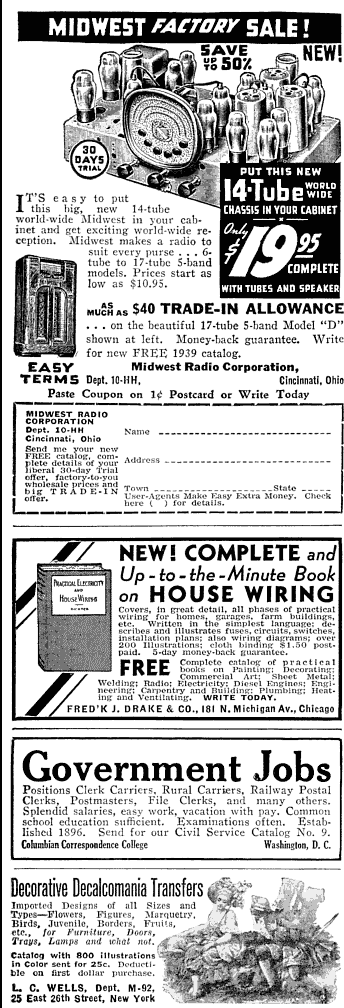almost within shouting distance, this station's service area will be limited to New York City and its immediate environs. A lot of good that will do people in Portland, Maine, Columbus, Ohio, St. Louis, Mo., Denver, Col., Seattle, Wash., etc.!
[Continued on page 90]
How much of a factor CBS will be in television is highly problematical. Once before-in 1931it bought and operated an RCA television station, made a lot of noise about it, and then quietly discontinued it when it had outlived its usefullness as a publicity medium.
More interesting but less important than the RCA and CBS moves was the entrance of Paramount Pictures into the television field. Paramount has bought an interest in the Allen B. DuMont Laboratories, of Passaic, N. J., a small but well-recognized establishment specializing in the manufacture of cathode-ray tubes (the "projector" of television receivers). According to the printed stories, Paramount will soon be set for big-scale television on a national basis, with transmitting stations on both coasts planned to give the public "this new type of entertainment". When sound broadcasting began to loom as the movies' first really serious competitor, Paramount bought an interest in the Columbia Broadcasting System, and then dropped it when they learned that there was nothing wrong with the movies that good pictures couldn't cure. Now, apparently, Paramount is making another attempt to cover itself, and protect its stockholders by entering television in case it does materialize into something more than hot air.
A visit to the DuMont plant reveals a significant picture of the part Paramount will play. DuMont himself is a two-fisted, aggressive scientist with a splendid technical background, some patents, and a lot of ideas. With Paramount's backing (which does not include control of his company), he is planning to erect a very low power television transmitter (only 50 watts) on top of the present two-story factory building, and to operate it experimentally with a system of his own, different from the RCA one. He will also make receivers-in fact, he's making one right now for the Empire State signals-but under the Paramount set-up the new receivers will reproduce only his broadcasts, not the NBC or CBS ones! How much of an audience Paramount expects to build up in the neighborhood of Passaic, N. J. (population, 62,959) with a flea-powered transmitter is something to conjure with.
"All this sounds very discouraging," you probably are saying. "Hasn't there been any progress in television at all?"
Sure, there's been wonderful progress in television since 1925, when C. Francis Jenkins of Washington, D. C., staged the first important demonstration of radio television before a distinguished audience of government officials. But the technical, artistic, financial and legal prob lems have been and still are terrific, with many

89